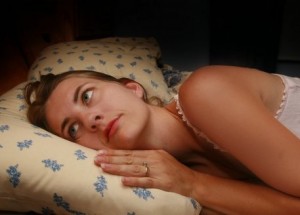 In the 1920s, when electricity was not nearly as prevalent (but sources of artificial light were common), Americans were surveyed on sleep habits. The average American slept 9 hours a night, which meant that many slept more. Today the average American is believed to sleep 6 1/2 hours a night. We have not biologically evolved to need less sleep.
In the 1920s, when electricity was not nearly as prevalent (but sources of artificial light were common), Americans were surveyed on sleep habits. The average American slept 9 hours a night, which meant that many slept more. Today the average American is believed to sleep 6 1/2 hours a night. We have not biologically evolved to need less sleep.
There are many types of insomnia: trouble falling asleep, trouble staying asleep, waking too early and sleeping at too superficial a level. People with sleep apnea may believe they sleep like a log, but they have hundreds of micro-awakenings from not being able to breathe, which send their adrenals into fight or flight mode and which leave them exhausted throughout the day. Sleep problems can be occasional, transitory (for short periods of time) or chronic. But the problem I see the most in practice is that people aren’t spending enough time in bed.
Why is this a problem? In a nutshell, it makes you fat, stupid and sick. We know that driving with insufficient sleep makes you as prone to accidents as drunk driving. Almost 1/4 of 18 to 29-year olds report they have fallen asleep at the wheel at some point during the past year, according to the National Sleep Foundation. And half of U.S. adults admit to driving while they are tired. Their judgment is impaired, their reaction times are reduced and they can’t think straight.
We know that people without enough sleep not only eat more, to keep thei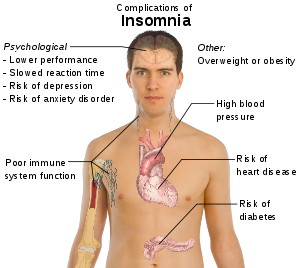 r blood sugar up, but use more cortisol which causes the dangerous belly fat.
r blood sugar up, but use more cortisol which causes the dangerous belly fat.
Sleep is very important for your immune system, both in terms of disease resistance and even in terms of resistance to parasites.
Researchers at the Max Planck Institute for Evolutionary Anthropology have shown that species that sleep more have greater resistance against pathogens. They found evolutionary increases in mammalian sleep times to be strongly associated with a better immune defense as measured by the number of immune cells circulating in peripheral blood. This relationship was detected in 4 of the 5 immune cell types and in both main sleep phases.
Insomnia
How many of us awaken refreshed? Most stay up too late, exercise and eat late, watch television or use computers before bed (which activates parts of the brain that we need to turn off,) or we sleep with light in the room (even those LEDs can interfere with melatonin.) We don’t go to bed at a consistent time every night.
Aside from sleep hygiene, there are a number of conditions that can interfere with sleep. Restless leg syndrome, painful joints or nerves, hiatial hernia, or even getting up to urinate with prostatic enlargement can all interfere with sleep. Many medications disrupt sleep. Sleep apnea ensures that the sleep you have isn’t effective. Similar disruption can occur if you sleep in a room that is noisy or that has artificial light coming in through a window or from appliances including your alarm clock. It helps to sleep with blackout curtains or a blindfold.
In Chinese medicine, when your heart qi is upset, from emotional problems or liver yang rising, or if your blood is insufficient to cool the heart, you will get insomnia. People suffering from the condition Liver Yang Rising can also have insomnia, especially if the heart is disturbed. Treatments with acupuncture, including points on the toe or head, and herbs can be quite effective for this.
Chinese medicine has seven categories of insomnia with a dozen standard formulas, and of course a Chinese herbalist would individualize those formulas for any patient presenting with insomnia. The causes range from digestive disturbances which affect the Spleen and Stomach, Liver heat which rises to harass the heart, Phlegm heat, Heart yin, yang, blood or qi deficiency or disturbances of the Seven Emotions. Different formulas would be given for each and it is best to be diagnosed so that the proper formula can be adapted to your needs.
Herbs and Supplements
There are many herbs or combinations for insomnia, and most of them are better for one type than another. For instance, valerian helps many people to sleep, but keeps others wired up. The people who benefit the most are those who are pale and deficient, with a pale tongue and who tend to take their anxiety out on their digestive tract. People who show ove rt sleep signs are more likely to get heated from the valerian and it will make insomnia worse. This is especially true if the valerian product is made of dried root, since volatile compounds that help you sleep have evaporated. I prefer valerian in a formula with herbs chosen from passionflower, zizyphus, hops, chamomile or skullcap.
rt sleep signs are more likely to get heated from the valerian and it will make insomnia worse. This is especially true if the valerian product is made of dried root, since volatile compounds that help you sleep have evaporated. I prefer valerian in a formula with herbs chosen from passionflower, zizyphus, hops, chamomile or skullcap.
Passionflower is very good for insomnia that comes from mental chatter, where you cannot easily quiet your mind. Combine passionflower with a hypnosis ta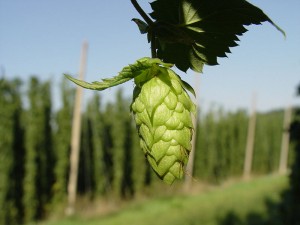 pe or progressive relaxation, feeling the sun come in through the head and relax each part of your body down to your toes.
pe or progressive relaxation, feeling the sun come in through the head and relax each part of your body down to your toes.
Hops is better for insomnia combined with a nervous stomach. It can be taken in tea, tincture, beer, infused into hot baths, or made into dream pillows. It combines well with passionflower and valerian.
Zizyphus, known as Suan Zao Ren, nourishes the heart and calms the mind. It is good for insomnia with irritability, insomnia, nightmares or stress induced hypertension. It is especially good for people with deficient heart blood, a Chinese term that includes anemia but is not identical to it. It is used in the form of Suan Zao Ren tang, a traditional Chinese sleep formula.
Chamomile is especially good for children, with insomnia due to growing pains, teething, irritability, nightmares and stomach problems. It works just as well for adults. Tea is probably the best way to take it, but chamomile baths are good for spasms, muscle pain and anxiety, so would also be good before bed.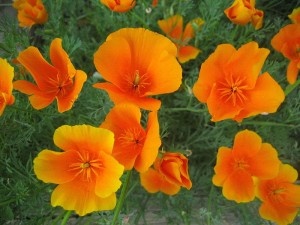
California Poppy is a mild sedative and mild painkiller and does not have the addictive potential of opium poppy. It is especially good for Yang rising type insomnia, with anxiety and headaches. It mixes well with Corydalis for insomnia due to pain.
Lavender is best known as a sedative when used as an essential oil. A few drops on a pillow or inhaled will help you sleep. In a peer-reviewed British study, when the sleeping room was perfumed with lavender, elderly nursing home residents with insomnia slept as well as they did when they took sleeping pills and better than they did when they were given neither sleeping pills nor exposed to lavender fragrance. Similar results were found with Korean college students, and depression was reduced as well. In fact lavender is very good for people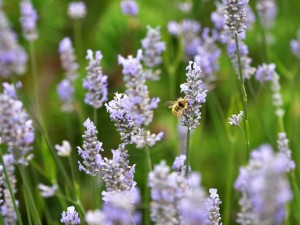 with black moods who suffer from insomnia, although it is not restricted to them. Infants given lavender baths cried less and slept more in a University of Miami study. Lavender pillow inserts and lavender tea or tincture will address insomnia as well.
with black moods who suffer from insomnia, although it is not restricted to them. Infants given lavender baths cried less and slept more in a University of Miami study. Lavender pillow inserts and lavender tea or tincture will address insomnia as well.
Kava has been found to reduce stress-induced insomnia. Kava seems to be more safely ingested in traditional water based and fermented forms than from standardized capsules. I suggest that people take a tea, tincture or glycerite form. Kava is especially helpful to women who are experiencing sleeplessness due to hormonal fluctuations or to people suffering from insomnia due to spasms. It can enhance dreaming.
Chinese polygala, Yuan zhi, is quite useful for insomnia with anxiety, bad dreams and stress-induced palpitations. It mixes well with zizyphus seed and gambir spines (Gou teng). It works well as a decoction.
Melissa, or Lemon Balm, is a mild sedative but does not have significant study. It makes a delightful tea or tincture. It is a mild antidepressant as well. Taken with St. John’s wort, lemon balm is useful for those who can’t sleep due to seasonal depression.
The dietary supplement tryptophan can be useful to induce sleep. Serotonin, a neurotranmitter which helps the sleep/wake cycle is manufactured by the body from the amino acid tryptophan. Herbs and foods high in tryptophan that help restore proper serotonin levels in the brain are St. John’s wort, quinoa, spirulina, and soy products.
Melatonin sold as a dietary supplement in the US, is a naturally occurring hormone that regulates the circadian cycle of several body processes. There are no foods known to raise melatonin levels significantly. In humans, melatonin is produced by the pea-sized pineal gland located in the center of the brain but outside of the blood-brain barrier. The melatonin signal forms part of the system that regulates the sleep-wake cycle by chemically causing drowsiness and lowering the body temperature. Light stimulates the gland, inhibiting melatonin, which is why it is better to sleep in the dark. Some people wear blue-blocker eyeglasses which prevents the light from strongly inhibiting this important sleep hormone. As a supplement, melatonin works to induce sleep, but I question whether it is a good idea to rely upon taking hormones instead of producing them.
Magnesium has declined precipitously in our diet. Between 1975 and the early 1990s, the USDA nutrient analyses of food showed an approximate 30% decline in magnesium levels, most likely due to industrial farming methods that have depleted topsoil. Magnesium is one of the most abundant elements in the human body. Its ions are essential to all living cells, where they play a major role in manipulating important biological polyphosphate compounds like ATP, DNA, and RNA. Hundreds of enzymes thus require magnesium ions in order to function. Spasms, constipation, depression and insomnia are four important problems caused by a lack of magnesium in the diet. Since dry forms are not easily absorbed, colloidal magnesium can most rapidly help many sleep disorders.
Foods and Insomnia
It is a good idea to avoid stimulating foods if you suffer from insomnia. Coffee, black tea, and chocolate have caffeine or caffeine-like compounds that can reduce sleep in many people. (Others of us have been known to drop our coffee cup as we nod off.)
Foods high in protein provide necessary amino acids. There is no evidence that eating turkey actually increases tryptophan, although a heavy Thanksgiving meal may induce sleep by causing a spike and drop in blood sugar. Generally amino acids need to be given alone to have specific attributes like inducing sleep.
Sea vegetables, herbs like nettles made into an overnight infusion and dark greens like kale can provide some of the missing minerals that will enhance rest. Alcohol can induce sleep, but it does not allow for the proper types of sleep so can make problems worse, and will generally not permit restful sleep.
Sleep deprivation is a major problem in contemporary America and contributes to chronic and acute diseases. We tend to underestimate what sleep deprivation can do. Unless sleep problems are resolved, it is unlikely that chronic disease can be successfully addressed.
